It is a top of the page.
- Home
- Sustainability
- Society
- Sustainable Supply Chain
Sustainable Supply Chain
Basic Policy
In order to make sure our transactions with supplier companies are based on mutual understanding and trust, we open our doors to companies across a wide spectrum both in Japan and abroad. And in addition to maintaining principles including faith, fairness, equity, and equal opportunity, our procurement activities comply with the law and social norms.
To actualize these goals, we have set as follows the philosophies in our conduct guide, the "Duskin Code of Conduct".
●Duskin Code of Conduct 4: With respect to our suppliers
- 1. Comply with laws and ordinances when conducting business transactions
- We fully understand the Act on Prohibition of Private Monopolization and Maintenance of Fair Trade, Act against Delay in Payment of Subcontract Proceeds, Etc. to Subcontractors and other relevant laws and ordinances and maintain fairness in all transactions in order to retain our relationships of trust with suppliers.
- 2. Request compliance from suppliers
- We require our suppliers to strictly observe all relevant laws and ordinances and enact stringent safety management to ensure that we only deliver safe and secure products and services to consumers and our customers.
- 3. Enter contract-stipulated relationships on an equal footing
- We only conclude fair contracts with suppliers after fully negotiating the conditions of business with them on a free and equal footing.
- 4. Apply impartial standards and proper procedures
- We only make final decisions on selecting suppliers and continuing business relationships by applying impartial standards for price, quality, and delivery time, and through proper procedures. We shall never establish or maintain any relationships with any companies, organizations or individuals who engage in anti-social behavior or activities.
- 5. Maintain proper relationships with suppliers
- We build up relationships of trust with suppliers only through honest communication with them in the context of business. We, and our families, will never accept, offer or demand any entertainment, wining and dining, or gifts that exceed the bounds of social commonsense to or from suppliers.
- 6. Respect international rules and adhere to local laws and ordinances
- In doing business overseas, we not only strictly observe international rules and local laws and ordinances; we also pay due respect to local cultures and customs in order to carry out business activities based on mutual trust. At the same time, our management seeks, through engaging in international business activities, to contribute to greater social richness of those countries and regions, in addition to pursuing our corporate profitability.
| FY 2019 | FY 2020 | FY 2021 | FY 2022 | |
|---|---|---|---|---|
| Number of suppliers | 603 companies | 448 companies | 449 companies | 454 companies |
| Amount spent | 49,850 million yen | 48,004 million yen | 50,105 million yen | 57,337 million yen |
Maintaining quality and considering the environment
When starting transactions with a supplier, we set requisite conditions including the agreement with Duskin management philosophy, possession of a management creed, maintaining a quality control and assurance system, compliance with laws for issues such as the environment, waste, recycling, labor practices, and labor safety hygiene, and active involvement in environmental and societal issues.
Strengthening partnerships with suppliers

In order to strengthen partnerships with our supplier companies, we believe it is important for them to understand the Duskin way of thinking. As part of this endeavor, Duskin holds a Supplier Study Session every year to share information on quality policies, compliance-related actions, and business plans for that fiscal year (development, sales promotion, and purchasing / distribution plans).
Additionally, we also receive information as needed from supplier companies regarding issues including industry trends, and market trends, as well as environmental and societal issues from an ESG and SDGs perspective.
| Participating company | FY 2018 | FY 2019 | FY 2020 | FY 2021 | FY 2022 |
|---|---|---|---|---|---|
| Direct Selling Group (number of companies) |
187 companies | Voluntarily suspended due to COVID-19 pandemic | 169 companies | 196 companies | 203 companies |
| Direct Selling Group (number of participants) |
187 participants | *On-demand streaming | |||
| Mister Donut Business Headquarters (number of companies) |
99 companies | Voluntarily suspended due to COVID-19 pandemic | 75 companies | ||
| Mister Donut Business Headquarters (number of participants) |
184 | 110 | |||
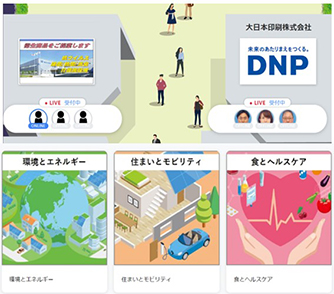
To promote business matching and marketing communication between supplier companies and our development specialists, we hold regular "Duskin Trade Shows".
In FY 2021, we held an online exhibition as a new approach from the perspective of preventing infection spread in the COVID-19 pandemic. 29 supplier companies showed exhibits.
Selecting new suppliers
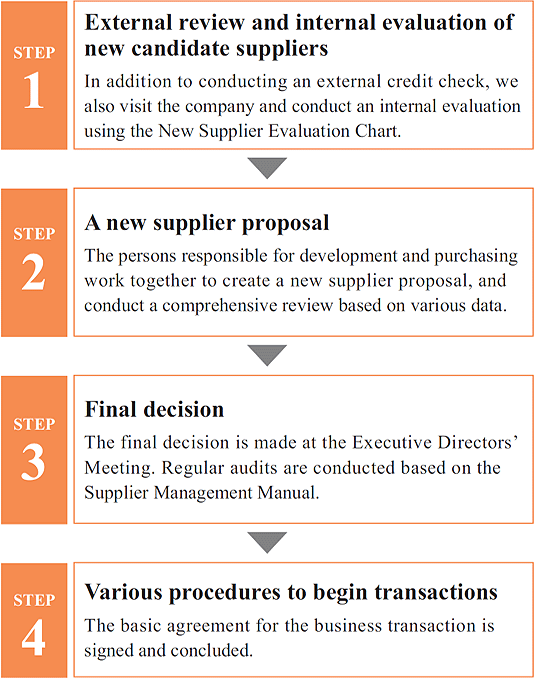
When selecting new suppliers, we always select companies that have completed prescribed procedures in accordance with regulations, with the prerequisite of fair, equitable, and free competition.
We ask new supplier candidates to prepare a self-assessment in advance to increase transparency and acceptability. Simultaneously, in addition to conducting external credit checks, Duskin representatives visit the candidate companies and perform an internal evaluation based on our own independent "Supplier Evaluation Chart".
This "Supplier Evaluation Chart" also checks candidate companies' ISO certification status, waste management status, efforts to reduce energy use, human rights, labor practices, and work environment.
Also, after transactions begin, we conduct regular audits based on the "Supplier Management Manual" to ensure quality and a stable supply of products, and we also work to reduce management risk by doing business with multiple companies for major commercial products.
Precautionary measures for product supply in emergencies
If a Duskin product manufacturer suffers damage from a natural disaster or other causes and product supply temporarily stops, this will cause inconvenience to the customer as well. Therein, we take proactive measures for the core products of the Dust Control Business and the Food Business, which are particularly influential.
- ■ Proactive measure philosophy
- 1.With the exception of procuring products that depend on a specific company from the viewpoint of manufacturing technology specificity, etc., we handle procurement by purchasing from multiple companies.
- 2.We survey the implementation status of proactive measures at our direct suppliers.
- 3.We preemptively select similar and substitute products that can be substituted in emergencies.
Periodic audits of outsourced raw material manufacturing plants

raw material manufacturing
plant (storehouse)
For plants of food product manufacturing subcontractors, we implement an initial audit before new transactions, audits at the time of manufacturing, and periodic audits in our quest for constant improvement. In our audits, food product plant specialist representatives evaluate the plant based on checkpoints that cover a wide range of areas, including plant facility and process management and sanitation and production management. Furthermore, periodic audits are conducted by ranking each plant according to audit evaluation points, etc., and are conducted according to rank.
| FY 2018 | FY 2019 | FY 2020 | FY 2021 | FY 2022 | |
|---|---|---|---|---|---|
| New audits | 10 plants | 14 plants | 3 plants | 11 plants | 6 plants |
| (New foreign plants) | 2 plants | 2 plants | No audits | No audits | No audits |
| Periodic audits | 30 plants | 38 plants | 24 plants | 18 plants | 36 plants |
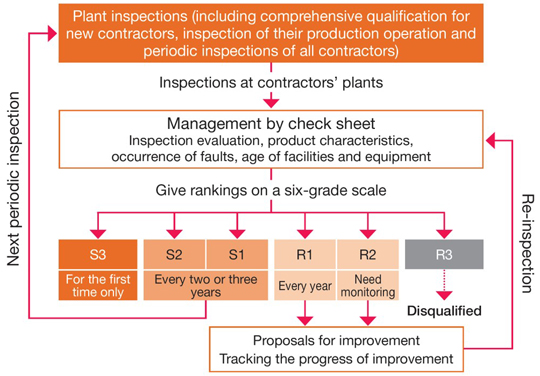
Basic Policy Concerning Sustainable Procurement
In addition to complying with the Duskin Code of Conduct (Compliance), we also work together with our suppliers to promote procurement activities that fulfill social responsibilities in areas including human rights, labor, and global environment conservation, and contribute to the actualization of a sustainable society.
- 1.Legal compliance and respect for international norms
- We promote fair and equitable procurement activities that comply with the laws of each nation and region and respect international conduct norms.
- 2.Consideration for human rights, labor, and safety and sanitation
- We promote procurement activities that consider the labor environment, safety, and sanitation in accordance with the "Basic Policy Concerning Respect for Human Rights" (initiatives promoting respect for basic labor rights such as the freedom of association, the right for workers to organize, and the right of collective bargaining, the prevention of forced labor and child labor, elimination of discrimination, and the promotion of comfortable work environments and human rights education and awareness).
- 3.Ensuring quality and safety
- We promote procurement activities in accordance with the "Duskin Quality Policy" that aim for the assurance of high quality, safety, and security based on the optimal standards of quality, cost, and supply.
- 4.Consideration for the global environment
- We promote procurement activities that consider global environmental conservation in accordance with the "Duskin Environmental Policy" (climate change measures including waste reduction, effective resource use, CO2 emission reduction, conservation of water resources and biodiversity, and continual improvement through environment management systems).
- 5.Maintaining information security
- We promote procurement activities that strictly manage confidential and private information.
| FY 2022 | |
|---|---|
| Human rights, labor problems, etc. | No instances where serious human rights violations or noncompliance were found. (0 instances in FY 2019, 0 instances in FY 2020, 0 instances in FY 2021, and 0 instances in FY 2022) |
| Notification and consultation desk for supplier companies | 0 usages of "Duskin Purchasing Clean Line" |
| Number of independent contractor deaths related to work | No instances. (0 instances in FY 2019, 0 instances in FY 2020, 0 instances in FY 2021, and 0 instances in FY 2022) |
Supplier audits regarding environmental and societal issues
Concerning palm oil extracted from the palm tree fruit, there is worldwide concern that the development of agricultural land for the trees will have a negative impact, including the destruction of tropical rainforests. So, when using these kinds of raw materials, we work together with supplier companies that we share partnerships with to construct appropriate procurement systems.
Together with trading companies and manufacturers, we regularly conduct onsite inspections of the Johor, Malaysia palm tree orchard and palm oil extraction plant and perform periodic audits of local oil manufacturing plant facilities.
In addition to attaining certification for the three international standards of the ISO9001 quality management system, ISO22000 food safety management system, and ISO14001 environment management system, this plant has also attained certification by HACCP, an international standard for food product hygiene management systems. Additionally, we implement thorough hygiene management by conducting Five S (Sort, Set in order, Shine, Standardize, and Sustain) activities and safety and hygiene training sessions monthly. Furthermore, regarding plant wastewater, we consider the surrounding environment through initiatives including self-inspections based on criteria we have set that are stricter than governmental standards and inspection-related data saving.
Palm oil must be pressed within 24 hours of harvesting the palms on the orchard or the quality will deteriorate. Because of this, extraction plant facilities for donut oil suppliers of Mister Donut are located within 48 kilometers of an orchard. The orchard and extraction plant facilities also implement 5S activity initiatives. In addition, sewage discharged from orchards and extraction plant facilities is treated by microorganisms in settling ponds, and the gases produced during the process are accumulated in an onsite plant to be reused as fuel.
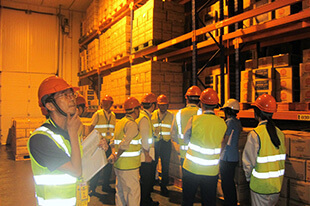
Periodic oil manufacturing plant audit 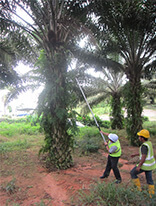
Palm tree orchard

Exhibiting company comment
Many people from departments we normally do not interact with came, and the trade show was a valuable opportunity to spread awareness about our merchandise.
It was easy to have people participate, and from the exhibitor perspective as well, it was easy to give detailed information about merchandise through document downloading. I felt that this was a merit unique to the online environment.
I look forward to participating again.
Information Innovation Division
Dai Nippon Printing Co., Ltd.